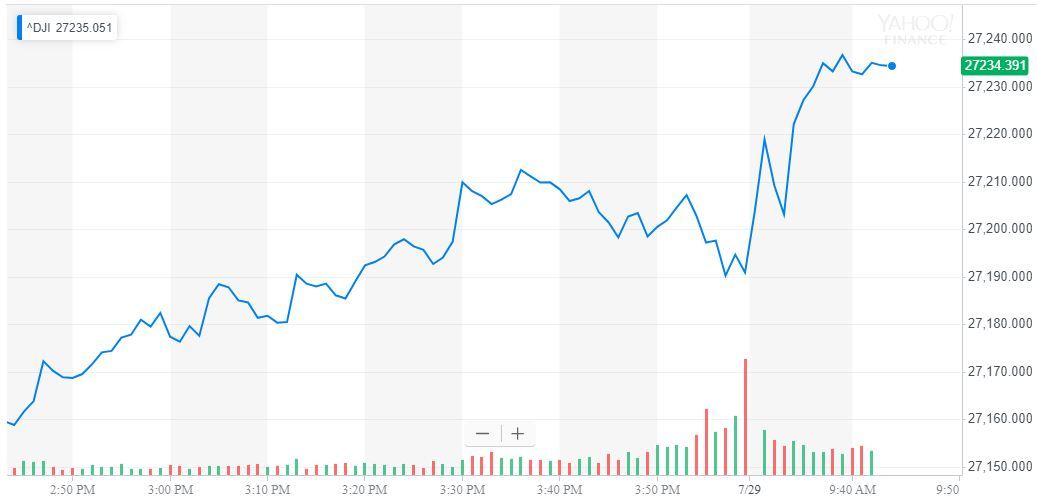Dow Freezes as Ex-Fed Chair Warns of ‘Weakened Economy’

The Dow flat-lined as the stock market waited for its long-desired interst rate cut, and an ex-Fed chair issued an economic warning. | Source: REUTERS / Joshua Roberts
The stock market is just days away from receiving the interest rate cut it so fervently desires, but optimism on that front failed to translate into an early-week surge for the Dow.
Meanwhile, former Federal Reserve Chair Janet Yellen warned of the “risks” of a “weakened” global economy.
Dow Cautiously Advances as S&P 500, Nasdaq Slump
Wall Street’s major indices tepidly entered the Monday trading session. The Dow Jones Industrial Average opened flat but managed to creep to a gain of 40.78 points or 0.15%; the DJIA last stood at 27,233.23 as of 9:42 am ET.

The S&P 500 and Nasdaq slid into decline, falling 3.75 points or 0.12% to 3,022.11 and 36.16 points or 0.43% to 8,294.05.
Janet Yellen Weighs in on Interest Rate Cut
Stocks tilted sideways ahead of this week’s Federal Open Market Committee (FOMC) meeting, where the Federal Reserve is universally expected to execute an interest rate cut , with most traders expecting a 25-basis point reduction.
Speaking in advance of the FOMC meeting, ex-Fed Chair Janet Yellen revealed that she believes a 25-basis point interest rate cut is appropriate given the numerous threats the US economy faces.
“The global economy has weakened. I think partly it’s weakened because of conflicts over trade and the uncertainty that’s caused for businesses,” Yellen – an Obama administration appointee – said at an Aspen Economic Strategy Group, according to CNBC.
Wall Street has a complicated relationship with economic data. On the one hand, poor economic data increases the odds of a sustained cycle of Fed easing, rather than just a one-off interest rate cut. On the other, a weakening economy is itself a threat to the stock market.
Stock Market Bear: GDP Print Doesn’t Erase Recession Risk
Recent data dumps have presented a mixed picture of the US economy. For example, second-quarter GDP beat expectations, but bearish economists such as David Rosenberg noted that 2.1% growth is far from a comforting figure.
Of course, the picture is even bleaker worldwide, which is why Yellen believes a 25-basis point cut is warranted, despite the fact that the Dow, S&P 500, and Nasdaq have all set new all-time highs within the past several weeks.
“The United States isn’t an island,” Yellen said. “We’re part of the global economy. What happens in the rest of the world — in Europe, in Asia — affects the United States. And it’s also true that U.S. monetary policy affects conditions all around the globe.”
Click here for a real-time Dow Jones Industrial Average (DJIA) price chart.